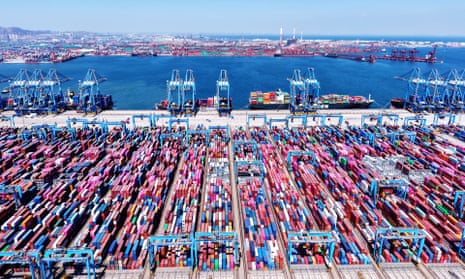Trump tariffs including 104% against China come into force
Donald Trump’s new tariffs on dozens of countries have come into effect, including 104% duties on Chinese goods, deepening his global trade war.
The round of so-called “reciprocal” tariffs on imports to the US – imposed from 12.01am Eastern Time (0401 GMT) – come as the US president’s punishing levies have shaken a global trading order that has persisted for decades, raised fears of recession and driven worldwide stocks sharply downward.
The S&P closed below 5,000 for the first time in nearly a year on Tuesday and is nearing a bear market, defined as 20% below its most recent high, Reuters reports. S&P 500 companies have lost $5.8tn in stock market value since Trump unveiled the tariffs last Wednesday.

A sell-off across Asian markets resumed on Wednesday after a brief respite, with Japan’s Nikkei down over 3% and South Korea’s won currency sliding to a 16-year low. US stock futures also pointed to a fifth straight day of losses on Wall Street.
Trump nearly doubled duties on Chinese imports, which had been set at 54% last week, in response to counter-tariffs that Beijing announced last week. China has vowed to “fight to the end” over what it views as blackmail.
Trump has offered investors mixed signals about whether the tariffs will remain in the long term, describing them as “permanent” but also boasting that they are pressuring other leaders to ask for negotiations.
“We have a lot of countries coming in that want to make deals,” he said at a White House event on Tuesday afternoon. He said at a later event that he expected China to pursue an agreement as well.
Key events
Asean chief urges ‘boldly’ integrating region’s economies
Asean must “act boldly” to accelerate regional economic integration as sweeping US tariffs leave much of the world caught in the middle of a devastating trade war, the bloc’s chief said on Wednesday.
The 10-member Association of Southeast Asian Nations, which count on the US as their main export market, were among those hit with Donald Trump’s steepest levies.
“To remain relevant and resilient in a world where economic chaos is fast becoming the new normal, we must act boldly, decisively, and together to reaffirm Asean’s commitment to a stable, predictable and business-friendly environment,” Asean’s secretary general, Kao Kim Hourn, told an investment conference.
Agence France-Presse reports he was speaking on the eve of a meeting of Asean economic and finance ministers as well as central bank governors in the Malaysian capital of Kuala Lumpur to discuss how to respond to the US tariffs.
Asean governments have chosen not to the retaliate against Washington, preferring dialogue. But their export-oriented economies risk being hurt by a global trade war after China – another key market – imposed its own tariffs on the US.
Kao said:
Without urgent and collective action to accelerate intra-Asean economic integration and diversify our markets and partnerships, we risk ceding our place in a fractured and fast-evolving global economy.
India central bank cuts rates
India’s central bank has cut interest rates, citing “challenging” global conditions, AFP is reporting.

Amy Hawkins
Chinese social media is abuzz with the latest tariffs, as Donald Trump’s 104% duties on Chinese goods kicked in on Wednesday.
One of the top trending hashtags on Weibo was “The US begs for eggs while fighting the trade war”, while another was “Trade barriers can’t stop economic globalisation”.
Weibo users mocked the US for suffering from an egg shortage, with some accounts sharing pictures of empty egg shelves in US supermarkets.
“If you can’t even handle an egg, why are you fighting a trade war,” one user wrote.
Influential Chinese bloggers have suggested that China could restrict the import of American poultry and eggs as a countermeasure in the trade war, which would be a further blow to US farmers.
Weibo users also discussed the prospect of iPhones rocketing in price thanks to the tariffs, with several people saying that they would switch to using phones made by Chinese companies Huawei or Xiaomi.
Nikkei and Taiwan stocks plummet as yen lifts after new tariffs
Japan’s Nikkei benchmark index has dived 5% while the yen rallied 1% as investors seek refuge as the new US tariff regime bites.
Stocks in Taiwan, meanwhile, fell 5.8% in afternoon trading, AFP is reporting.
Indian pharmaceutical stocks fell 1.7% on Wednesday after Donald Trump reiterated plans to announce a “major” tariff on all pharmaceutical imports.
The US accounts for a third of India’s overall pharma exports.
Trump also threatened the duties on Friday, after his first set of reciprocal tariffs earlier last week exempted pharma products – a change in stance that had prompted a wild swing in pharma stocks, Reuters reports.
On the day, all 20 constituents of the pharma index were lower, with the index dragging down the benchmark Nifty 50 by about 0.52% as of 9.20am IST.
Gland Pharma, Lupin and Zydus Lifesciences were the top losers by percentage, down between 3% and 5%. Sun Pharma and Cipla, the top constituents by weight, fell 1.69% and 1.87%, respectively.
India’s pharma exports to the US mostly comprise generics, or cheaper versions of popular drugs. These currently attract almost no US levies, while India imposes about 10% tax on US pharma imports, according to industry experts.
The US and and China are heading towards an all-out trade war while locked in a high-stakes game of brinkmanship as Donald Trump unleashed his new wave of tariffs today.
For more on that and all the key developments as the global economy is rocked again, see our full wrap here:
The new US tariffs against dozens of its trading partners include rates of 104% on China, 20% on the European Union, 26% on India and 49% on Cambodia.
They are tailored to specific countries based on a formula that has been criticised by economists that divides trade in goods deficit by twice the total value of imports.
“President Trump has a spine of steel and he will not break,” the White House press secretary, Karoline Leavitt, said on Tuesday. “And America will not break under his leadership.”
As the report by Helen Davidson and agencies says, the US president believes his policy will revive America’s lost manufacturing base by forcing companies to relocate to the US. But many business experts and economists question how quickly – if ever – this can take place, warning of higher inflation as the tariffs raise prices amid intensifying fears of a recession.
Most countries have so far declined to impose reciprocal tariffs – China being the main exception – but today could see some retaliation from the European Union.
EU member states will vote today on a list of US goods to be subjected to retaliatory tariffs. The list of potential targets facing mainly a 25% levy ranges from almonds to yachts, via diamonds and dental floss, soya beans and steel parts. But bourbon and wine have been spared.
The full story is here:
Trump tariffs including 104% against China come into force
Donald Trump’s new tariffs on dozens of countries have come into effect, including 104% duties on Chinese goods, deepening his global trade war.
The round of so-called “reciprocal” tariffs on imports to the US – imposed from 12.01am Eastern Time (0401 GMT) – come as the US president’s punishing levies have shaken a global trading order that has persisted for decades, raised fears of recession and driven worldwide stocks sharply downward.
The S&P closed below 5,000 for the first time in nearly a year on Tuesday and is nearing a bear market, defined as 20% below its most recent high, Reuters reports. S&P 500 companies have lost $5.8tn in stock market value since Trump unveiled the tariffs last Wednesday.
A sell-off across Asian markets resumed on Wednesday after a brief respite, with Japan’s Nikkei down over 3% and South Korea’s won currency sliding to a 16-year low. US stock futures also pointed to a fifth straight day of losses on Wall Street.
Trump nearly doubled duties on Chinese imports, which had been set at 54% last week, in response to counter-tariffs that Beijing announced last week. China has vowed to “fight to the end” over what it views as blackmail.
Trump has offered investors mixed signals about whether the tariffs will remain in the long term, describing them as “permanent” but also boasting that they are pressuring other leaders to ask for negotiations.
“We have a lot of countries coming in that want to make deals,” he said at a White House event on Tuesday afternoon. He said at a later event that he expected China to pursue an agreement as well.
Base metal prices in China fell on Wednesday, with copper hitting an eight-month low, as the looming 104% US import tariff on Chinese goods heightened concerns about slowing growth.
The most-traded copper contract on the Shanghai futures exchange dropped 2.0% to 71,950 yuan ($9,789) per metric ton as of 0333 GMT, hovering near its lowest level since 12 August last year.
The benchmark three-month copper on the London metal exchange was down 1% to $8,570 per metric ton, Reuters reports.
China’s yuan slides to 19-month low
The yuan dipped further against the US dollar to a fresh 19-month low on Wednesday after the Chinese currency slid to a record low in offshore markets overnight.
The yuan weakened to a low of 7.3505 per dollar in the morning trading session, the lowest since September 2023, as investors fretted about the intensifying China-US trade tensions.
The offshore yuan pared losses and climbed about 0.62% to 7.3812 yuan per dollar in Asian trade, after sinking more than 1% in the previous session and hitting its weakest level on record at 7.4288 per dollar overnight, Reuters reports.
Japan’s finance minister has said trade negotiations with the US could include discussions on foreign exchange rates.
“There has been various communication, including on exchange rates, from the US side, so currency moves could be among themes up for discussion,” Katsunobu Kato told parliament on Wednesday. “But specifics have yet to be set.”
Kato also said any discussions on exchange rates would be held between the finance chiefs of the two countries, Reuters reports.
While not confirmed, Kato is expected to visit Washington later this month when G20 finance leaders gather on the sidelines of the International Monetary Fund spring meetings. The visit opens up the chance for Kato to hold his first face-to-face meeting with US Treasury secretary Scott Bessent.
Given President Donald Trump’s focus on addressing the huge US trade deficit, some analysts say Japan may face pressure from Washington to help reverse the yen’s downtrend, which gives its exports a competitive advantage.
Billions wiped off Australian stocks

Jonathan Barrett
In Australia, shares swung wildly early on Wednesday, wiping tens of billions of dollars of value from the market over concerns the world’s two largest economies are headed for a full-blown trade war.
The S&P/ASX 200 opened slightly lower, before plunging more than 2% a few minutes into the session, erasing the rebound of the previous day. By midday, the benchmark had recovered to the 7,435 point mark, representing a 1% fall for the session.
Mining companies were early casualties of the drop, with BHP shares falling more than 4% in early trading. Australia’s largest biotech company, CSL, was also down more than 4% after Donald Trump announced that a “major” pharmaceutical tariff was coming soon.
Resources companies, especially those involved in iron ore extraction, are particularly sensitive to any slowdown in global economic growth and a trade war between the US and China.
The full story is here:
The New Zealand Reserve Bank cut interest rates on Wednesday citing US trade tariffs, one of the first central banks to respond to the economic turmoil sweeping markets worldwide.
“Recent increases in tariffs and uncertainty about global trade policy have weakened the outlook for global economic activity,” the central bank said, announcing it would lower the country’s key interest rate.
It’s one hour until Donald Trump’s slew of new tariffs on the US’s largest trading partners are due to come into effect, despite fears of widespread global economic damage and calls to reconsider.
The US will also go ahead with imposing a 104% tariff on China from 12.01am ET (12.01pm China Standard Time) on Wednesday, the White House confirmed after Beijing did not lift its retaliatory tariffs on US goods by Trump’s Tuesday noon deadline.
The so-called reciprocal tariffs are also due to hit about 60 other countries.
The latest tariffs are higher than the 10% flat rate imposed on all global imports to the US last week and are tailored to specific nations based on a formula that has been criticised by economists.




